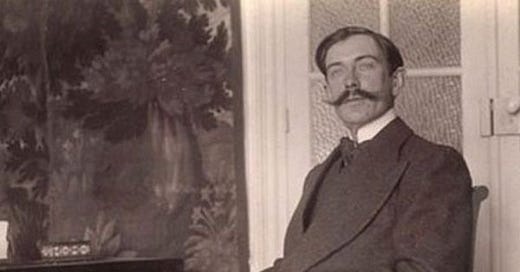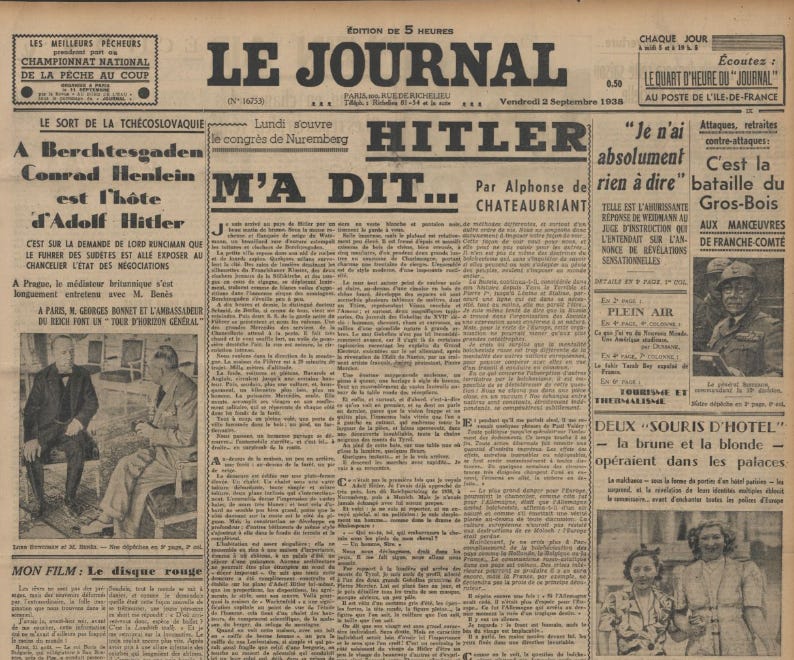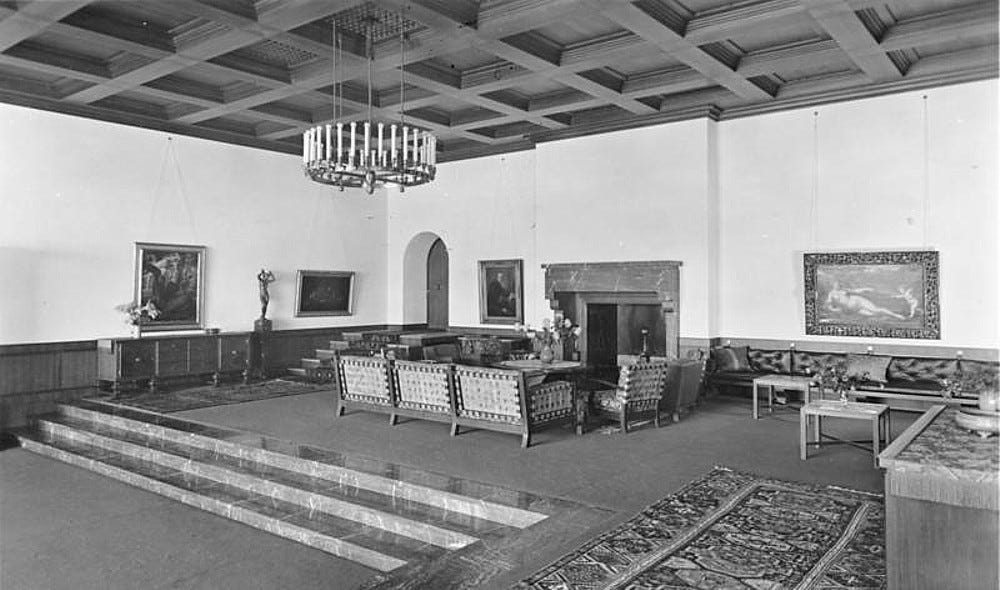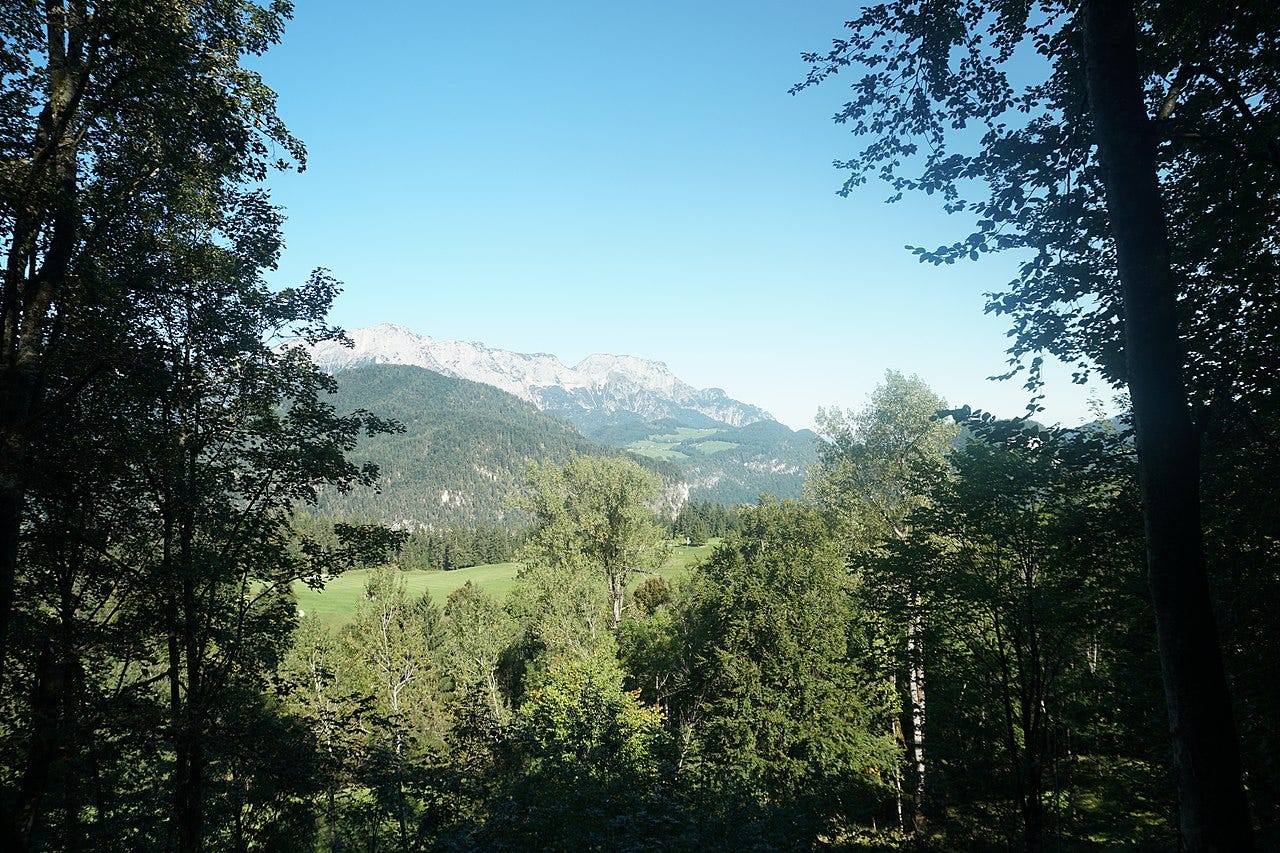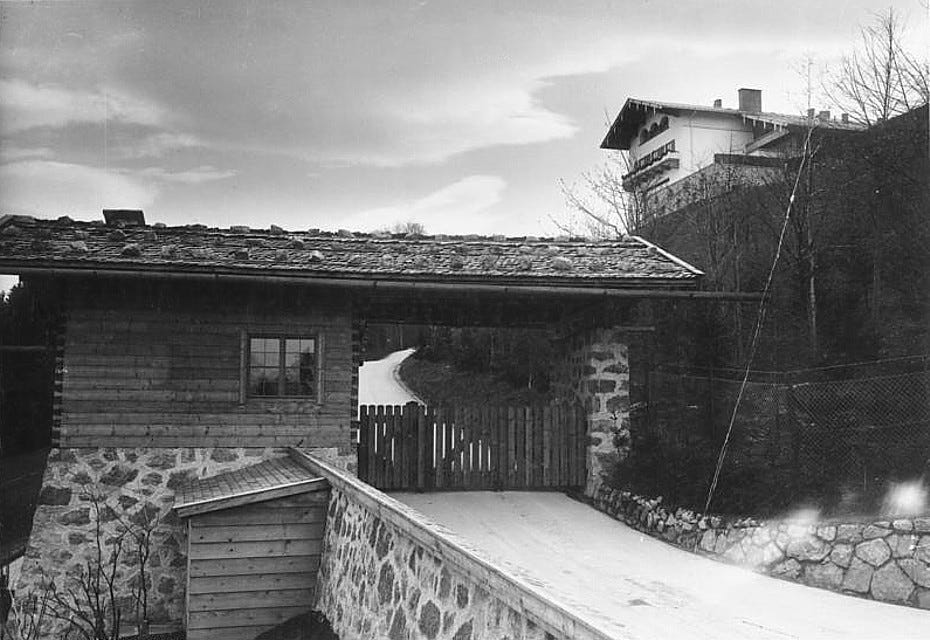I arrived to the country of Hitler a nice foggy morning. Under the rocky mass flanked by snow of Watzmann, a pink aurora fog blurred the roofs and bell towers of Berchtesgaden.
The little town lies on its nest of rocks and heavy fir trees. A few red kites fly over the city. Rays of light draw the silhouettes of the Franciskaner Kloster, two twin bell towers of the Stifskirche. Clouds shaped in the manner of a stork’s neck, moving slowly, drag along as white veils in the immense circus of the mountains. Berchtesgaden awakens little by little.
At half past ten, the distinguished Dr. Schmid, from Berlin, so well known to everyone, joins me. Then two S.S. from the Führer's black guard show up and we follow them. One of the large Mercedes of the Chancellery services is waiting at the door. It is very hot and the wind is blowing hard, a veil of dust dries the air, the street is busy, the traffic is intense.
We drive in the direction of the mountain. The Führer's house is a 20-minute drive away. A thousand meters high.
The crowd, cars and pedestrians, Bavarians and English, circulate up to a certain height. Then, suddenly, no more cars, and suddenly, a kilometer further, not a man in sight. The powerful Mercedes, alone. She climbs, completes her turns in her solitary snoring, which reverberates on each side in the depths of the forest.
Suddenly, in the middle of the road, a city gate shaped in wood; at the foot, a sentry.
We pass, an immense landscape appears… the car stops… and there it is… to the right… overlooking the road.
Above the house, a little behind, a forest; above the forest, a peak of snow.
The residence is built on a platform high. A chalet. A chalet under a vast overhanging roof, very simple and a thin roof, two inclined planes that intersect. The whole gives the impression of vast bays, very white walls; and all this first doesn't seem very big, because the side facing the road is the side of the gable. But construction is developing in depth; other buildings of the same style are added and complete it.
The dwelling is quite odd; it in no way resembles a house of importance, like a castle, a summer palace, a residence of power. No architecture could be more foreign to the concern for “imposing decor.” We know that this entire residence was completely built and established according to the plans of Adolf Hitler himself, that the proportions, the arrangements, the amenities, the style, are his work. This is why the house of “Wachenfeld” has a capital significance from the point of view of the study of the man, it is like the chalet in the heights, the scientific camp, the house of the shepherd, the mountain refuge.
When we see this house, with its roof as an “old lady’s headdress", a bit like the headdress of our Lorientaises, so simple and that appear as fragile as that of a sheepfold, we touch the spring of necessity which led here one day he who, already, in his prison at Landsberg, had written these words: “The strong man who is alone is even stronger.”
You would have to have never felt the need for the solitude of the summits yourself to not be impressed in the face of these mountains and this little gatehouse lost in the middle of silences.
Captain Wiedemann, in 1917, an officer of the Führer in the trenches, today his aide-de-camp, picks me up at the car: “The Führer is waiting for you,” he tells me.
And behind him I climb the wide staircase. The captain precedes me into the gallery. Seeing between the strong, squat columns of this gallery with its Romanesque arches, the broad horizons, one experiences a feeling of vastness and open air...
Distance by distance, large ushers in white vests and black slacks stand at attention.
An immense room, but the ceiling is relatively low. It is made up of thick and massive boxes of oak wood, well hollowed out, with five moldings, from which hang two large chandeliers in the shape of Charlemagne's crown, each carrying around thirty candles. The whole is modern in style, with an imposing rusticity.
The wall all around painted in a plain, light color, above a dark oak wood picture rail, develops spaces where several master paintings are hung, including a Titian, representing reclining Venus and Love; and above all, two magnificent rugs. We could swear they were Gobelins1 from the 17th century: men, horses, chariots and carriages, in the middle of a splendid nature with large trees. The word Gobelins is not here inconsiderately employed, because these are certain tapestries recounting the exploits of the Great Elector, executed on German soil, after the revocation of the Edict of Nantes, by an eminent French artist, Protestant emigrant, Pierre Mercier.
An enormous ancient world map, a grand piano, a bronze eagle clock. A whole gathering of large armchairs around the round reception table.
And finally, and above all, and first, that is to say what we see first, and what we talk about last, because the vision strikes and never leaves. The immense bay window which you have on the left upon entering, which embraces the entire width of the room, and allows you to see, in an unforgettable discovery, the entire snowy range of the Tyrolean mountains.
At the foot of this bay, on a bare table where the light shines, a few flowers. A few moments… and I see him arriving. He quickly comes down the steps… I go to meet him.
It wasn't the first time I was meeting Adolf Hitler. I had already approached him very closely, during the Reichparteitag of 1936, in Nuremberg, then in Munich. But I had never exchanged any words with him.
And here it is: I am neither a reporter, nor a special correspondent, nor a politician; I am simply a man… like in Shakespeare's drama:
“Who are you, you who obstruct the path under my horse's feet?”
“A man, Sire.”
We stare at each other, straight in the eyes. He signals to me, we're going to sit down.
In relation to the light coming from the mountains of Tyrol, I am seated in profile, leaning against one of the two large Prussian Gobelins by Pierre Mercier. He is placed facing the daylight, and I can detail all the features of his face, a serious face, a little pale.
He is dressed in a gray summer suit, strong shoulders, round head, full face…, the face that we know, the hairstyle that we know, the height that we know.
It is said that his face does not have much individual character. No doubt. But this individual character would be far from having the importance and meaning here that we believe! On the contrary, it is the striking side of Hitler's face that it is to some extent the face of many others, and thus expresses the agreement between the physical man and the political idea that he came to embody.
His person does not give an impression of authority bursting with Caesarean tension, but, more internally, of latent dynamism. Not the slightest apparent pose, and one would seek, it seems to me, in vain in his diction and his attitude, the reflexes of the man who would have listened one day to the temptations of satisfied pride. Great simplicity towards himself: this is what one can see. With a gesture of his hand, he invites me to speak. I describe to him what had been my travels across Germany…
"I realize,” he says, “the difficulty that a foreigner must feel in front of the German mentality, how many pains he must take to explain to himself the current German effort. Because it is not simply about different sensibilities, but about different methods, and above all another way of life. We do not think in the slightest of imposing our way of seeing things… This perspective is suitable to us, and it could be unsuitable to others… But that is not the case for the doctrines of Bolshevism which, without bothering to find out whether or not they can adapt themselves to the genius of peoples, wish to impose themselves on the entire world…”
“Russia,” he continues, “considered within its history from Ivan the Terrible and Peter I, up until Lenin and Stalin, runs through a line which is within its own necessity, at least, that is what it seems like to me… I am even tempted to say that Russia has found in the organization of the Soviets an expression quite adapted to its own nature. But, as for the rest of Europe, this organization could only lead to the greatest catastrophes. I believe also that the Bolshevist Russian mentality is too different from the mentality of other European nations to be able to cooperate with them in the view of a project to be accomplished in common. As for the absorption of other territories by Bolshevism, it is impossible to not be interested in this question! We do not live in a closed room, in a vacuum! Our exchanges between nations are constant, narrowly independent, subtly interlinked.”
And as he was speaking to me so, a few phrases of Paul Valéry came to mind: “Every policy up until now speculated on the isolation of events. This era is at its end. Every action henceforth reverberates on a quantity of unpredictable events. The effects of effects, previously insensible or negligible, are instantly felt at all distances… In a few weeks very far circumstances change the friend into an enemy, the enemy into an ally, victory into a defeat…”
“The greatest danger for Europe,” continued the Chancellor, “as it was for Germany, was that Germany turned Bolshevist,” he affirmed with an assured tone and as if he was emitting a truth above any possible discussion. “European culture would not have resisted to the destructions of Moloch: Europe would have been lost. Now I no longer believe in the accomplishment of the bolshevization of countries like Holland, Belgium, or of France… Russo-Asiatic communism in those countries is defeated. Internal crises could appear, there will be more. But France, for example, will not become the prey of this devouring principle…”
He repeated once more: “If Germany had yielded, there was no more hope for Europe… It was Germany which stopped at the last moment the rush of a tragic destiny.”
There was a silence. I look: the forehead is human, but the lower part of the face is implacable… He spoke, his hands interlocked in front of him, his eyes fixed upon a fixed direction.
As we can see, the question of Bolshevism does not wait, when speaking with Adolf Hitler, for the accidents of the conversation to bring it to the table. It is immediately mentioned. And what also emerges from the way in which it is mentioned is not that this argument is produced by the need for captious diplomacy, but that it corresponds well, in the mind of the current head of Germany, to what he really thinks of the danger that Bolshevism poses to the world.
Was he not the man who, in Vienna, for five years, had to earn his living as a laborer and a small painter? “Hunger,” he said, “was then my constant companion.” It was thus that, mixed with the workers and living their lives, he had seen the devastation that Asiatic theories of destruction and death can produce. He insists on it, he comes back to it…
The chancellor says:
“Germany has escaped this death grip. And yet, horrible poverty reigned in her midst, the absence of any outlet for her production, which led to immense lands being emptied of their human substance, condemned her to be of all nations the one which risked the most to be subjugated. And she was about to be. But the German worker understood in time. This is what made it possible to free him from the fatalism that burdened him. We have strived to raise his standard of living, while preserving him from any illusion; it was necessary for this that the value of his work was always equal to his salary, that is to say that any salary and any pay paid in Germany only possessed the intrinsic value of which the work provided presented its equivalent in the form of produced items. Money now only plays an intermediary role here… The situation of the worker is therefore improving more and more, although it is still far from being where we hope to get it. Have you visited many factories?”
Upon my affirmative answer:
“Work is done in an orderly and peaceful manner… I therefore no longer have any difficulty in that regard. If there were “asocials” — we have observed, most of the time that these are individuals with a very long criminal record — the national socialist movement could not hope to have the necessary force for this gigantic struggle, only if it succeeded in awakening in the hearts of its adherents the sacred conviction that political life would be raised above a simple electoral formula and would find itself in the presence of a new philosophical conception of fundamental importance…”
“This task,” I said, “begins today for all people… A great effort of renovation is required of all… But nothing will be possible for them if they do not place before all formulas of economic organization, the spirit of heroism…”
Upon hearing these words, his face lit up. I felt that I had just touched a primary line of thought in him.
“Alas, Excellency, this effort towards heroism will be made even more difficult by the harshness, precisely of this economic struggle. that…”
He went off immediately.
“The economic situation in Europe,” he said, “will remain a source of disagreement and dissent, as long as each state, in dealing with its own affairs, only considers itself. The situation will only be resolved in a harmonious and happy way when, deliberately, all European nations have entered into an active regime of collaboration2, when this regime of collaboration is sincerely, effectively desired by all, admitted by all, wanted by all. It's a whole new spirit that must be produced, enshrined... And this spirit must appear, it must be born! Otherwise, we will continue to see the nations, in wars similar to the last one, destroy like bad children the fruit of their labor. The European nations are made to cooperate in the work of their common prosperity. The wars, and the last one above all, which have arbitrarily disposed of territories and peoples, must be viewed from an objective point of view as disastrous errors committed by these same nations. Economically, as in all domains, the peoples should only think of pursuing their work of fertile collaboration.”
“...Germany is accused,” he continued, “of wanting to cut off its relations with the outside world and to lock itself into the isolation of its economic life. They do not reflect upon the fact that Germany has found itself more affected by the upheaval of the world economy than any other country, due to its relatively small and at the same time overpopulated economic space. Moreover, it was only after it had become completely obvious that we could not obtain vast commercial agreements with foreign countries that we in fact resolved to make the economic organism independent from abroad. It was therefore necessary to look for new ways. Also, through the four-year plan we are working to ensure that Germany can be self-sufficient, and this is not with the aim of isolation. Remember, she has been put in a situation that requires her to respond in this way and strive to become economically independent. She submitted to this regime and this discipline, in anticipation of a possible forced isolation, as could make her fear, at some given moment, the consequences of a Bolshevik penetration extending around of her.”
“The trial of National Socialism,” I say, “is mainly led by its adversaries on the fact of the unanswerable limitations imposed by the State on the individual. We French people, in fact, see an attack on freedom…, freedom is what the French value above all.”
“It is indeed being said abroad,” replied the Führer, “that in National Socialist Germany, the Germans are not free. But it's a bit ridiculous to hold this language… You cannot violate a people of 70 million men for years… Our task was not to impose our ideas on the German people, on the contrary, our intention was to rally the entire people of Germany to our convictions. How many men, under the pretext of freedom, harmed the people! In the National Socialist State, there is no man who does not have a full responsibility towards the Volk… It is too often, besides, when politics is just the public game put on by the parties, that the freedom of individuals, in the middle of the mass of citizens, is left destitute. Freedom of the individual, to be what it must be, must feed on the strength of the State when the State is made of the substance of the individual; and the State is made of the substance of the individual when he recruits and distributes himself in all the cells of the body of the nation, under the form of leaders chosen and educated among the best, the strongest, and the most brave of the people… Have you seen our youth?”
“I saw them,” I said, “they are healthy and disciplined. I have not forgotten the welcome given to me in a camp of nine thousand young people of the Hitlerjugend at Offenburg… Your youth is more unified than our French youth in its directives; but our younger generations also present a very striking physiognomy. They are one of the strengths of France.”
He bowed his head. “France,” he said… This was said in a certain tone and with a certain deep bass resonance.
I had already returned to France twice during this long journey, and I had impressions of an extraordinary return… The first time, it was one morning, the plains were smoking, teams of six and eight white oxen pulled the plow in the hard lands, and I had understood for the first time, felt by contrast, the landed splendors of France. What it is made of, the old rural France always powerful, resistant, always attached to its work songs. And hearing him say: “France…”, I thought about all that and I asked myself: “Has he seen that?… Or has he seen enough of it?” Then he said slowly:
“We have had many problems with France throughout History, but we are nonetheless two peoples of the same family. And this I said to all of Germany: there are bonds between us which have created an indescribable memory. We exchanged ideals, we gave each other examples and lessons. Let's be fair, we have less reason to hate each other than to admire each other.”
His gaze returned to his mountains and stayed there… there was another silence.
“I understand, Excellency, that the National Socialist Revolution is not a free invention, but that it corresponds to an evolution which is taking place today in all peoples; not because the people want it, but because something hidden within them wants it. Each people, or each nation, having a genius, must, according to this genius, find and realize the highest expression of themselves…”
“Certainly, to each people, their own Truth.”
“In France,” I told him, laughing, “everyone has their own Truth… And that can have its good side too! Everyone can thus manage to create a little communism of their own, and general indoctrination is avoided.”
He smiles.
“It is assumed that in this new disciplined organism, individuals will lose their personality; but, it is entirely the opposite!… We do not believe that the time of the creative power of individuals is finished, and that it could be replaced by the power of the formless collective mass… We hold that the highest value of the individual will appear once again, and that it is by drawing from the strongly linked and ordered activity of the community of men of his race, that the individual, as an individual, will find his greatest strength.”
This was his last declaration. I left him.
He remained upright, his hand pressed on the mirrored surface of the large table, brightened by the light of the mounts of Tyrol… and my last vision was his backlit silhouette, cut out on the background of the distant snows.
Manufacture des Gobelins, a tapestry manufacture founded in the 17th Century by order of King Henri IV. Located at Avenue des Gobelins in the 13th arrondissement of Paris.
I want to stress here that the connotation behind the word “collaboration” here, which is the same word in the French, has absolutely nothing to do with the connotation of the post-war period of “working with an occupying, enemy power”. Keep in mind that this article was published in 1938, before the war. I hesitated to translate this into co-operation for emphasis, but I chose to remain faithful to the original word employed.

